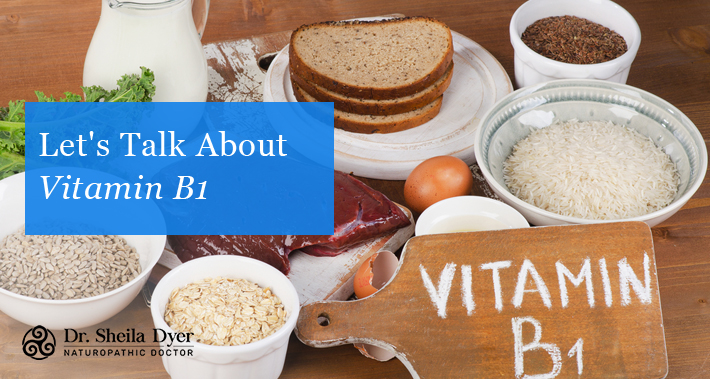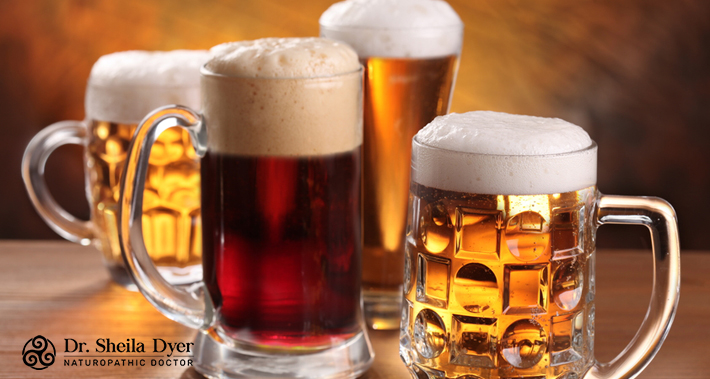
We’ve all heard it’s important to get our vitamins.
But keeping track of all the different vitamins, the benefits they have, and which foods are high in what can be confusing at times.
Most people know vitamin C, for example, can help combat colds and is found in citrus fruit.
Or that vitamin D comes from the sun and is essential for strong bones.
However, when it comes to some lesser known vitamins, the details start to get a little foggy.
Today we’re going to look at one vitamin which plays a key role as a naturopathic stress management solution – vitamin B1.
Keep reading to learn more about this important B vitamin, what can happen if you don’t get enough of it, and foods to eat to ensure you’re getting enough.
What Is Vitamin B1?
Also called thiamine, vitamin B1 is one of the B complex vitamins.
Vitamin B1 is an essential nutrient, meaning it can’t be created by the body, and therefore must be obtained through diet or supplementation.
It plays an important role in the function of the heart, brain, and nervous system as well as being used by the body to convert food into energy.
Symptoms Of Vitamin B1 Deficiency
As with any vitamin, there are a number of symptoms you may experience if you’re not getting enough vitamin B1.
Let’s take a look at some of the things you might notice if you don’t have enough of this important nutrient in your system.
1. Irritability
You’ve probably experienced irritability at some point in time.
Getting upset or frustrated by seemingly small things, or feeling agitated when even the tiniest thing doesn’t go as you planned.
Irritability has been shown to be one of the earliest signs of a B1 deficiency.
It is also often present in infants with beriberi disease, which is caused by low levels of thiamine.
2. Loss of Appetite
Thiamine is thought to help control the “satiety centre” of the brain, which causes us to feel full, or hungry.
Low levels of B1 can result in feelings of being full or satiated even when you haven’t eaten recently.
3. Reduced Reflexes
As we mentioned above, vitamin B1 plays a role in the functioning of the nervous system.
B1 deficiency if not address can result in changes to your reflexes and may affect coordination and ability to walk.
4. Muscle Weakness
Just about everyone will experience muscle weakness at some point in time, however, this is usually short-lived and often easily linked to something such as fatigue or illness.
Longer-term muscle weakness is often due to thiamine deficiency, and generally goes away with supplementation.
5. Nausea And Vomiting
The reason for a link between B1 deficiency and gastrointestinal symptoms such as nausea and vomiting are unclear, as this is a less common side effect.
There have been, however, cases in which digestive symptoms have been resolved after thiamine supplementation was introduced.
What Causes Vitamin B1 Deficiency?
Vitamin B1 deficiency is relatively rare in developed countries such as Canada, however, some factors which can increase your risk include:
- Use of diuretics
- Alcohol abuse
- Ageing
- Dialysis
- Bariatric surgery
- Diabetes
- AIDS or HIV positive status
Benefits Of Vitamin B1
We’ve talked about what can happen if you don’t get enough thiamine, so now let’s have a look at some of the benefits it has.
1. May Relieve Painful Menstruation
Most people who menstruate know the painful cramps which can accompany one’s monthly period.
They can be rather debilitating, and often lead to missed work and school if not treated properly.
Supplementation with thiamine may help reduce pain and cramping for those who experience periods.
2. May Help Prevent Blindness
The most common cause of blindness is a disorder called uveitis, where the tissue just beneath the outer surface of your eyeball becomes inflamed.
Uveitis is responsible for a significant amount of blindness worldwide.
Research from the University of Texas shows that vitamin B1 when taken in the form of benfotiamene can prevent uveitis from developing.
There’s also evidence that vitamin B1 can play a role in helping prevent cataracts.
3. May Help With Metabolic Disorders
Metabolic disorders can increase the risk of conditions such as stroke, heart disease, kidney disease, and diabetes.
Vitamin B1 plays an important role in the metabolism of glucose and can help reduce the risk of metabolic disorders.
Dietary Sources Of Vitamin B1
Vitamin B1 is found in a wide range of foods, including:
- Yeast
- Pork
- Poultry
- Legumes
- Peas
- Lentils
- Soybeans
- Dried beans
- Nuts
In addition, many foods are fortified with thiamine including:
- Pasta
- Cereal
- Rice
- Bread
Should You Take Vitamin B1 Supplements?
Most people will get enough vitamin B1 through their diet.
If you are worried you might be in a group at risk for vitamin B1 deficiency, or you don’t get enough of the foods which have it due to food allergies or other factors, then speak to a naturopathic doctor in Toronto about options for supplementation.
In these cases, rather than simply supplementing with B1 alone, you may get a recommendation for a B complex vitamin.
Book An Appointment With Dr. Sheila Dyer, ND
Are you worried your diet is lacking in vitamin B1 – or any other vitamin for that matter?
Have you been experiencing the symptoms listed above, and can’t figure out what might be causing them?
I’m Dr. Sheila Dyer, ND a naturopathic doctor in Toronto, and I want to help.
I’ll do a complete assessment to determine areas where your nutrition may be lacking, and if you have any risk factors which need to be addressed, and then create a treatment plan to help address your concerns and help get you feeling your best.
Contact me, Dr. Sheila today to book your free 15-minute consultation today.
If you have questions about naturopathic medicine, or would like to start with your first consultation, contact me, and let’s book an appointment.
Dr. Sheila Dyer, ND1080 Dovercourt Rd,
Toronto, ON M6H 2X8
(416) 554-5135
► https://g.page/DrSheilaDyerNd
Dr. Sheila Dyer is a Naturopathic Doctor and a practicing registered nurse offering holistic healthcare with a scientific focus
